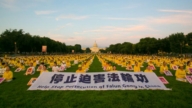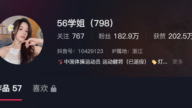【新唐人2011年2月24日讯】最近有网民在论坛爆料,广东遂溪街头出现一张“城内换届村委主任选举选票”的公告,一张选票可换取600元。而这股求官歪风也早在校园蔓延开来,中国大陆媒体调查指出,在100名受访学生中,愿意当班干部的多达81人,不少小学生为了当选“班官”,甚至“贿选”收买同学。
中国网站《华声网》网友发贴说,2月20号,广东省遂溪县街头多处公告栏出现了一则雷人的“好消息”。并附上照片。从照片中可以清楚的看出,红色的纸上写着“好消息”三个大字,接下来写着“收购城内换届村委会主任选举选票,凭委托书来换取每张600元”。在公告的下方还留有购买者的联系电话。
网贴发布后,网友纷纷质疑遂溪县这次村委换届选举的公平性。《华声网》记者从遂溪县民政局证实了这件事情,虽然选举已经延期了。但这种公然购买选票的行为,竟然能在社会上大喇喇的上演,网友发出惊叹:“这是在选商人,还是在选政客。”
中国选举专家姚立法:“这种买票的情况在整个中国比比皆是。6元的、60元、600元甚至1600元以上的,在中国到处都有发生。通过这种形式选出来的村官不可能为老百姓做好事,他只会充分的利用他手中的权力为他个人,为他那个小集团去获得更大的、更多的利益。”
新学期刚开始,校园也上演“贿选”的真实剧码!
《三秦都市报》报导,西安的刘先生发现儿子的300元红包不翼而飞,原来是儿子为了当班长,拿钱请同学吃饭打游戏。刘先生责备儿子,不把心思用在学习上却搞这些没名堂的事,儿子反而说他“老套”。
刘小弟说,他的学习成绩在班上都是前3名,可连组长都当不上。别的同学家长为了孩子能得到老师“照顾”,平时给老师送购物卡、会员卡,逢年过节送高级礼品,就算成绩平平也能当班长。他花钱请同学是为了选班长,可以改变家庭的现状。
而香港《明报》报导说,去年杭州某小学要选大队委员,校方新增了“网络投票”,短短两天,在25名候选学生中,票数最多者居然有7万多票,有19人的票数超过1万票。原来,是有家长为了给孩子投票,整天守在电脑前不停地点击,还有家长发动其他亲友甚至国外的亲友也来投票。
根据《明报》调查发现,小学生热中当干部的理由是“当班干部能得到老师的重视,同学的拥护,家长夸赞,感觉很有面子,还有小学生认为当班官能管人、挺威风的”。小学生因为迷恋“当官”,去年还发生南京小学生“朵朵”因竞选班长失败,负气离家出走的悲剧。
报导还说,有内地学者认为,孩子们对当官趋之若鹜,主要是源于社会公众,对掌握一定权力和资源的公务人员的迷信思想,这种现象需要警惕。
西安一家小学校长常玉红也表示,让孩子们竞选或轮流当班干部,让孩子们淡化“官”与“民”的身份差别,或许可以解决这种现象。
新唐人记者李庭、萧宇特约记者林莉采访报导。
Bribery on Chinese Campuses: Unhealthy Societal Trend
Some netizens recently revealed on online forums,
in Suixi Village of Guangdong province, a vote in the
village committee director election is worth 600 yuan.
This unhealthy trend of seeking officialdom
has already started spreading on campuses.
A Chinese media survey shows that out of 100 students,
81% would like to become class cadres (leaders).
Many even bribe their classmates to get elected.
Netizens posted on Chinese website Huasheng.com
that on Feb. 20, Suixi County’s bulletin boards
had some shocking “good news" announcements.
They read: “We buy votes for village committee director
general election. Each vote is 600 yuan."
Under the announcements was the purchaser’s number.
After reading the posts, many netizens questioned
the fairness of Suixi village committee election.
Huasheng.com journalist confirmed with the local
Bureau of Civil Affairs of the authenticity of the story,
although the election has been postponed.
The blatant act of buying votes caused netizens to sigh:
“Is this the election of businessmen or politicians?”
Yao Lifa, Chinese expert on elections: This situation
is commonplace everywhere in China, such as 6 yuan,
60 yuan, 600 yuan or 1,600 yuan or more.
This practice is widespread in China.
Officials elected in this way will not benefit the people.
They would use the power to benefit themselves
and gain more interests for his small cliques.
Sanqin Daily reported, Mr. Liu form Xi’an discovered
that his son’s 300 yuan was missing.
In order to become the class leader,
his son used the money to bribe his classmates.
Mr. Liu blamed his son for engaging in such useless
practices, but his son called him “old-fashioned".
Mr. Liu’s son Xiaodi said, although with good marks,
he couldn’t even be the head of a work team.
To gain a favor from the teachers, some parents of
the students would give them gift cards, membership
cards or luxury goods. So even mediocre students
can become class monitors.
He spent money on fellow students for his election.
Hong Kong’s Ming Pao reported that in 2010,
a primary school in Hangzhou held an election.
The school used online voting.
In just 2 days, out of the 25 candidates,
some students received over 70,000 votes.
Nineteen students received over 10,000 votes.
It turned out that their parents repeatedly voted for them.
Some even mobilized their friends and relatives to vote.
A Ming Pao survey shows that the reason students
want to get elected is because they feel they could
receive teachers’ attention, students’ support and
parents’ praises as a class monitor.
Also, they can lord over other students this way.
Some pupils are obsessed with “officialdom".
For example, after failing the class monitor election,
a student in Nanjing even ran away from home.
The article also said, some Chinese scholars believe,
the children’s obsession with “officialdom” originated
from their blind faith in public servants, who control
power and resources.
People need to guard against this phenomenon.
Chang Yuhong, a primary school principal in Xi’an,
said, the children should take turns to be class leaders,
to distinguish less between “officials" and “people".
This practice may solve the current problem.
NTD reporters Li Ting and Lin Li




























